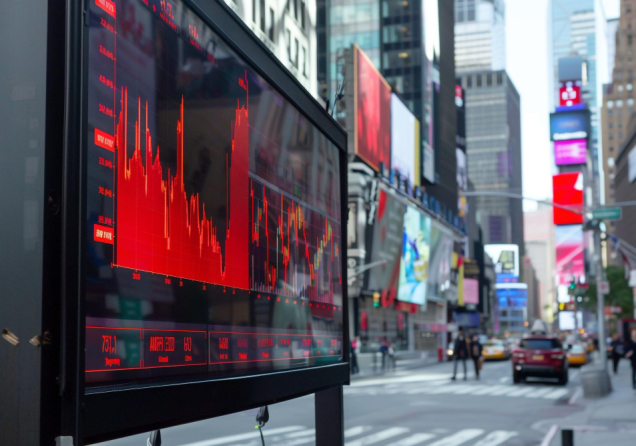Best Low Spread Indices Brokers
Indices are financial instruments based on the performance of a group of stocks representing a particular market or sector. It's a popular and effective way for investors to gain exposure to broad market movements without having to buy individual stocks. Essentially, indices have an in-built diversification without the excessive risk of trading single stocks.
To invest in indices, traders need to pick a quality broker that offers indices and has regulation by reputable organizations. In this review, we will look at some of the best Low Spread Indices Brokers. We will look at the selection of indices offered, the spreads, the trading platforms available, and the regulation of the brokers.
Understanding Indices Trading
Before we look at the individual brokers, let's briefly understand indices trading and its significance in the financial markets. Indices, such as the S&P 500, Dow Jones Industrial Average, or the FTSE 100, represent a basket of stocks that collectively reflect the overall performance of a specific market or sector. Trading indices allows investors to speculate on the general direction of the market without having to analyze individual stocks.
Investors can trade indices through various financial instruments. These include futures contracts, options, and contracts for difference (CFDs). The choice of instrument often depends on the investor's risk tolerance, trading strategy, and the specific requirements of their trading account.
Our Criteria for Selecting The Best Low Spread Indices Brokers
It is important to understand the reasons why we believe the brokers we list here stand out among the multitude of brokers that offer indices trading. Below are the key features we looked at while developing this list.
- Spreads and commissions - Trading fees can significantly impact your overall profitability. We will only feature brokers that offer competitive and transparent pricing.
- Market Products Available - Different brokers may offer access to different indices and markets. We will consider the indices available on the various broker sites and the availability of other markets, such as forex or commodities.
- Trading Platform Available - A robust and user-friendly trading platform is essential for executing trades efficiently. We will feature brokers with platforms that are fast and have technical analysis capabilities.
- The Regulatory Status - We will only choose brokers that are regulated by reputable financial authorities. Regulatory oversight ensures that the broker adheres to strict standards and provides a secure trading environment.
With that out of the way, let’s now take a look at our picks for some of the best brokers for indices trading. Note that all the brokers on this list offer indices as CFDs. This means that traders do not need to own the underlying assets to speculate on their price movements.
Quick Indices Spreads Comparison Table
While researching for this review, we collected and recorded the number of indices some of the major brokers offer and their minimum or average spreads. To standardize things, we used the Nasdaq 100 index spreads on the various broker sites. Please be aware that these spreads are subject to change over time. For the most accurate and up-to-date information, we recommend visiting the respective brokers' websites. Brokers often disclose either their minimum or average spreads, but rarely both. In most cases, the average spread serves as a more accurate representation of the actual spreads offered by a broker has.
Below, you'll find a comparison table summarizing our findings.
| Broker | Number of Indices | Minimum Spread on Nas100 | Average Spread on Nas100 | Regulation |
| Pepperstone | 23 | 1.0 | 1.2 | FCA, CySEC, CMA, DFSA, BaFin |
| FP Markets | 15+ | - | 1.29 | ASIC, CySEC, FSCA |
| Exness | 10 | - | 18.1* | FCA, CySEC, FSCA, CMA |
| XTB | 28 | 0.8 | - | FCA, CySEC, FSCA |
| Forex.com | 15+ | 1.5 | - | FCA, CFTC, NFA, CySEC, ASIC, CIRO |
| eToro | 21+ | 0.015 % (≈3.22) | - | FCA, ASIC, CySEC |
| XM | 31 | 1.8 | 2.24 | CySEC, ASIC, FSC |
| IQ Option | 12 | 1.35 |
| CySEC |
| Libertex | 28 | - | - | CySEC |
*Spreads recorded on 05.12.2024 at 11:30 P.M GMT from the official websites of the brokers. **Exness is the only broker from the list that provides Swap-free trading of the Nasdaq Index.
Pepperstone
Pepperstone is a well-established forex and CFDs broker that provides robust platforms for low spread indices trading. Traders on Pepperstone can trade a variety of popular indices. These include but are not limited to the US 30, US 500, the synthetic index VIX, GER 40, and AUS 200. The broker provides competitive spreads on indices, such as the NAS100. For example, with Pepperstone, the minimum spread on this index is 1.0, and the average spread is 1.2 at the time of writing.
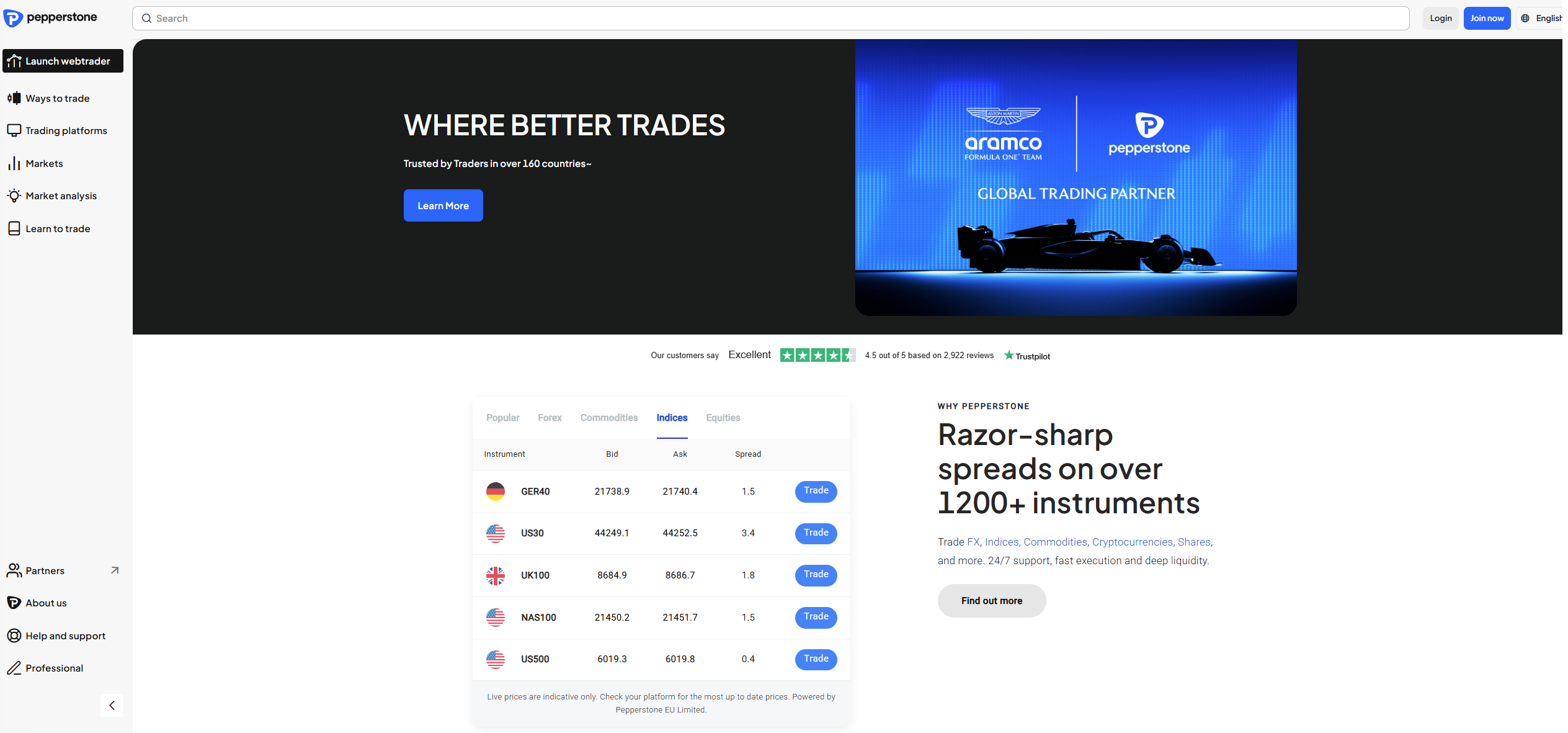
In addition to indices, Pepperstone offers a diverse range of trading instruments. These encompass CFDs on forex pairs, commodities, stocks, currency indices, ETFs, and cryptocurrencies. This allows traders to diversify their portfolios efficiently. The broker provides multiple trading platforms, including MetaTrader 4, MetaTrader 5, TradingView, and cTrader. As an ASIC-regulated broker, Pepperstone is one of the best TradingView brokers in Australia today.
On top of the ASIC’s regulation, the broker also holds regulatory licenses from other organizations around the world. These include the FCA, the CySEC, the CMA, and the DFSA in the DIFC.
75.3% of retail CFD accounts lose money
FP Markets
FP Markets is a Forex and CFDs broker that features one of the most diverse collections of trading instruments totalling over 10,000 different assets. Among these are over 15 different indices available to traders. These include popular indices such as the US 30 index, the US Tech 100, UK 100, and the AUS 200, among others. The spreads for trading these indices on FP Markets are competitively low, starting from as low as 0.15 pips. The NAS100 index on this broker site has at the time of writing this an average spreads of 1.29 across all FP Markets' platforms.
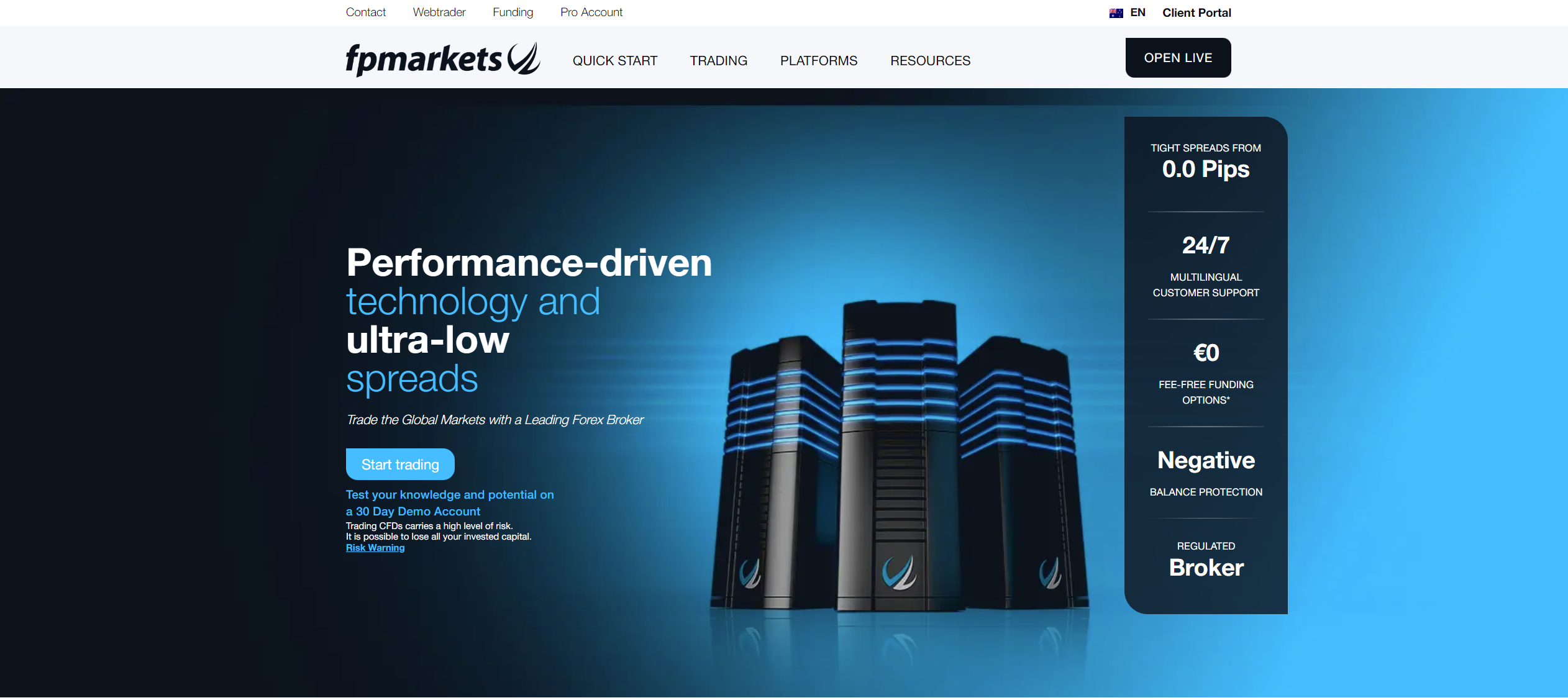
Traders can also invest in other market products that range from forex currency pairs to CFDs on shares, commodities, metals, bonds, ETFs, and cryptocurrencies. There are four different trading platforms available to choose from which include MetaTrader 4, MetaTrader 5, TradingView, and cTrader. The regulatory status of a broker is very important to look at as it shows the credibility of the broker. Fortunately, FP Markets has regulations from two tier-one regulators, the ASIC and the CySEC. On top of that, the broker has regulations by the FSCA in South Africa.
72.44% of retail CFD accounts lose money
Exness
We cannot talk about the best brokers for indices trading without mentioning Exness. Exness is a reputable forex and CFDs broker that provides access to a variety of financial instruments, including a selection of indices for traders. Traders on Exness can access popular indices such as the US 30, US 100, UK 100, AUS 200, and more.
The spreads on these indices are fairly competitive and dynamic depending on the market conditions. At the time of writing this, the US100 index has an average spread of 18.1 on the standard account, 12.7 on the pro account, 0 on the zero account, and 0.3 on the raw spread account.
Please note that the zero account charges a commission fee from $0.05 for each side per lot and the raw spread account a commission fee of up to $3.50 each side per lot. The Pro, Zero and Raw Spread Accounts have a minimum deposit requirement of 500 USD while the standard account is only 10 USD. Interestingly, Exness provides a swap-free option on all indices, making it an excellent choice for long-term investing.
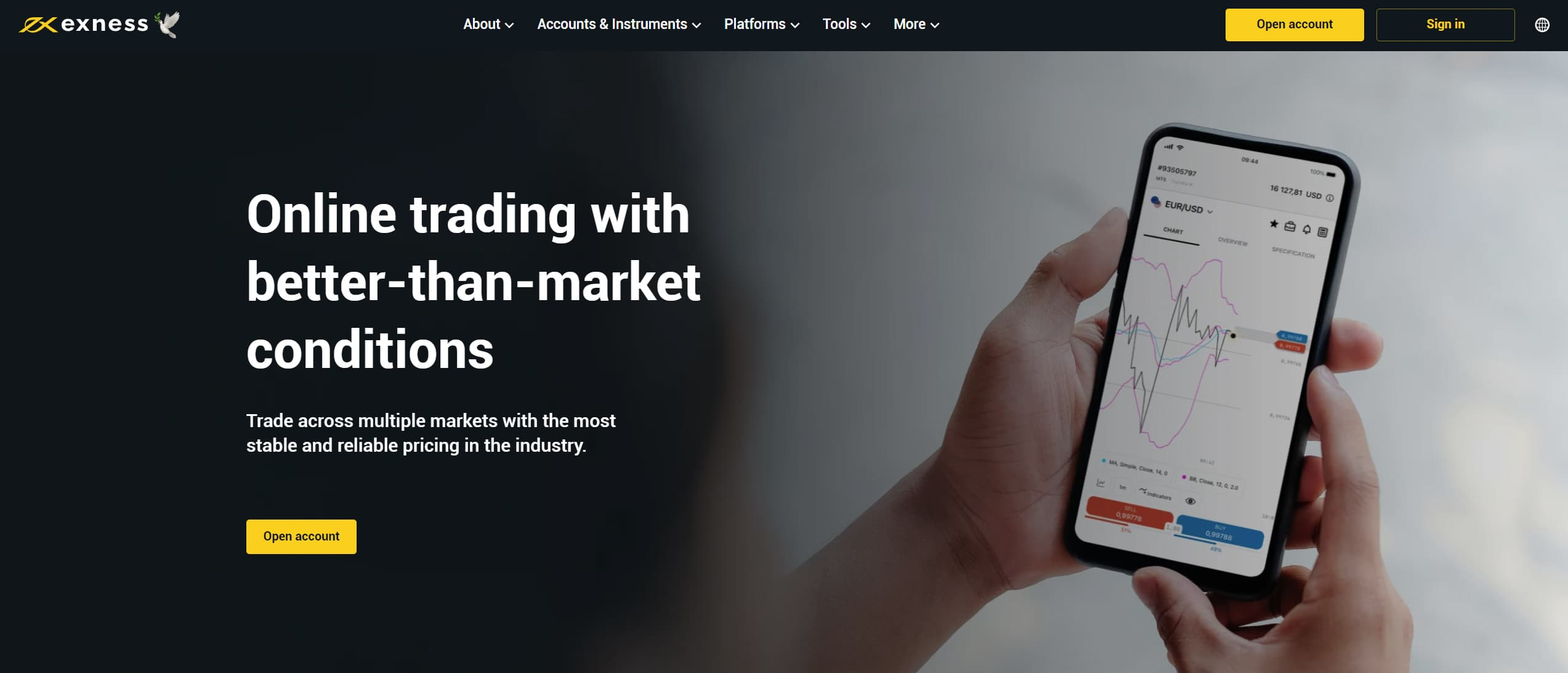
In addition to indices, Exness provides a diverse range of trading instruments. These include forex pairs, commodities, metals, and cryptocurrencies. This allows traders to diversify their portfolios within the same platform. Exness offers MetaTrader 4, MetaTrader 5, Exness Terminal, and Exness Trade App as the trading platforms. These platforms are known for their user-friendly interfaces and advanced charting tools.
When it comes to regulation, Exness is regulated by reputable authorities around the world. These include the FCA, the CySEC, the FSCA in South Africa, and the CMA in Kenya. This regulatory oversight ensures a secure trading environment for users.
Remember that forex and CFDs available at Exness are leveraged products and can result in the loss of your entire capital.
Please ensure you fully understand the risks involved.
XTB
XTB is a regulated CFDs broker in several jurisdictions with over 20 different indices from around the world. The broker holds licenses from the FCA in the UK, the CySEC in Cyprus, and the FSCA in South Africa. The regulations by the FCA and the CySEC are notable due to the regulators’ strict financial laws.
XTB provides competitive spreads on a variety of popular indices that traders gain access to. These include major indices like the US 30, Germany 30, UK 100, S&P 500 and France 40. For instance, the NAS100 index features a minimum spread of 0.8, the US500 offers 0.3, and the UK100 has 1.4.
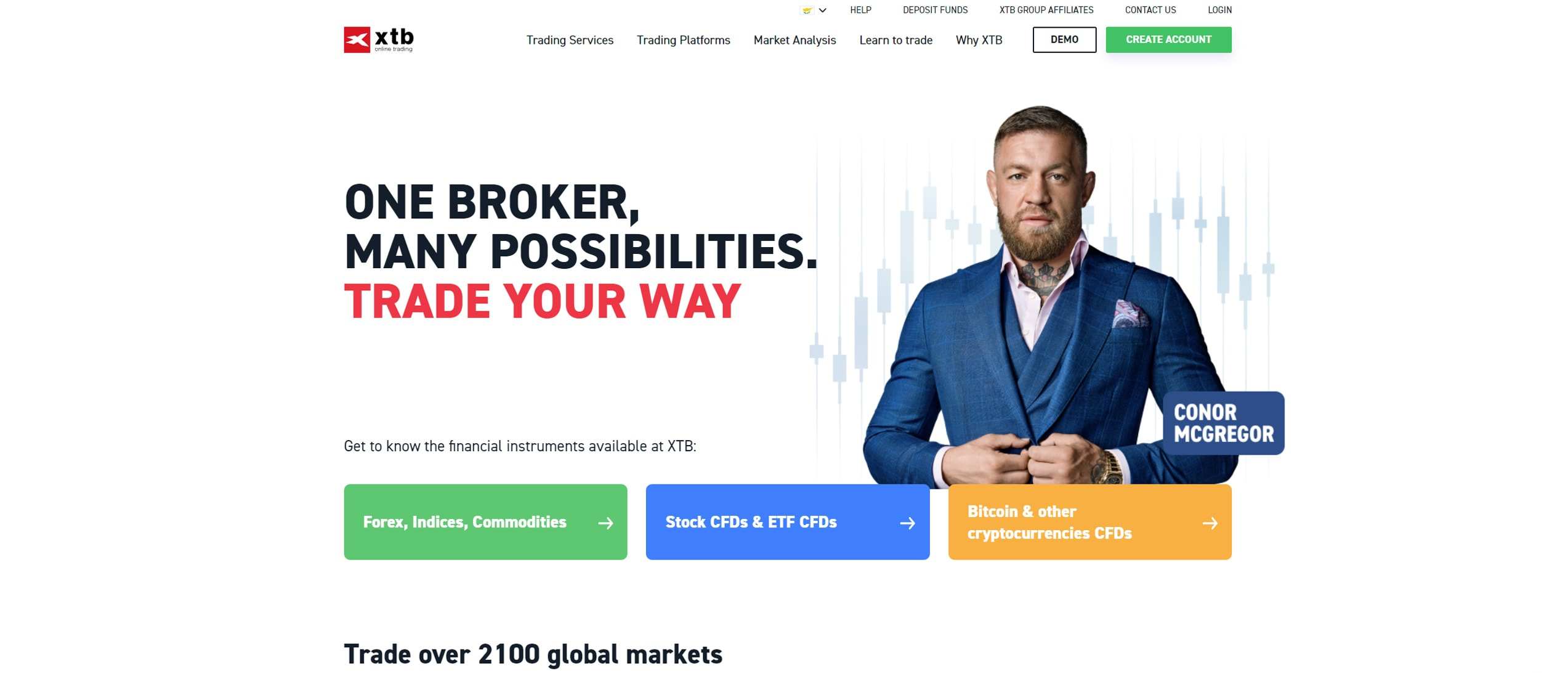
Apart from indices, XTB offers other market instruments from various global markets. These include forex pairs, commodities, stocks, ETFs, and cryptocurrencies. This allows traders to build well-rounded portfolios within the same platform. XTB provides a user-friendly trading platform, xStation 5, produced by its in-house team of developers.
75-78% of retail investor accounts lose money when trading CFDs with this provider.
Forex.com
Forex.com is a well-established forex and CFDs broker with various popular indices available to traders. This broker site allows traders to access over 15 of the most popular global indices with low spreads. These include popular indices such as Wall Street (Dow Jones), US Tech 100, US 500, UK 100, Germany 40, China 50, and more. When trading indices with Forex.com, traders gain the benefit of fixed spreads during market hours. The spreads are competitively low on some of the indices available on Forex.com. For example, the NAS100 index offers spreads as low as 1.5, the FTSE100 has spreads starting at 6.0 points, and the DAX40 features spreads as low as 7.2.
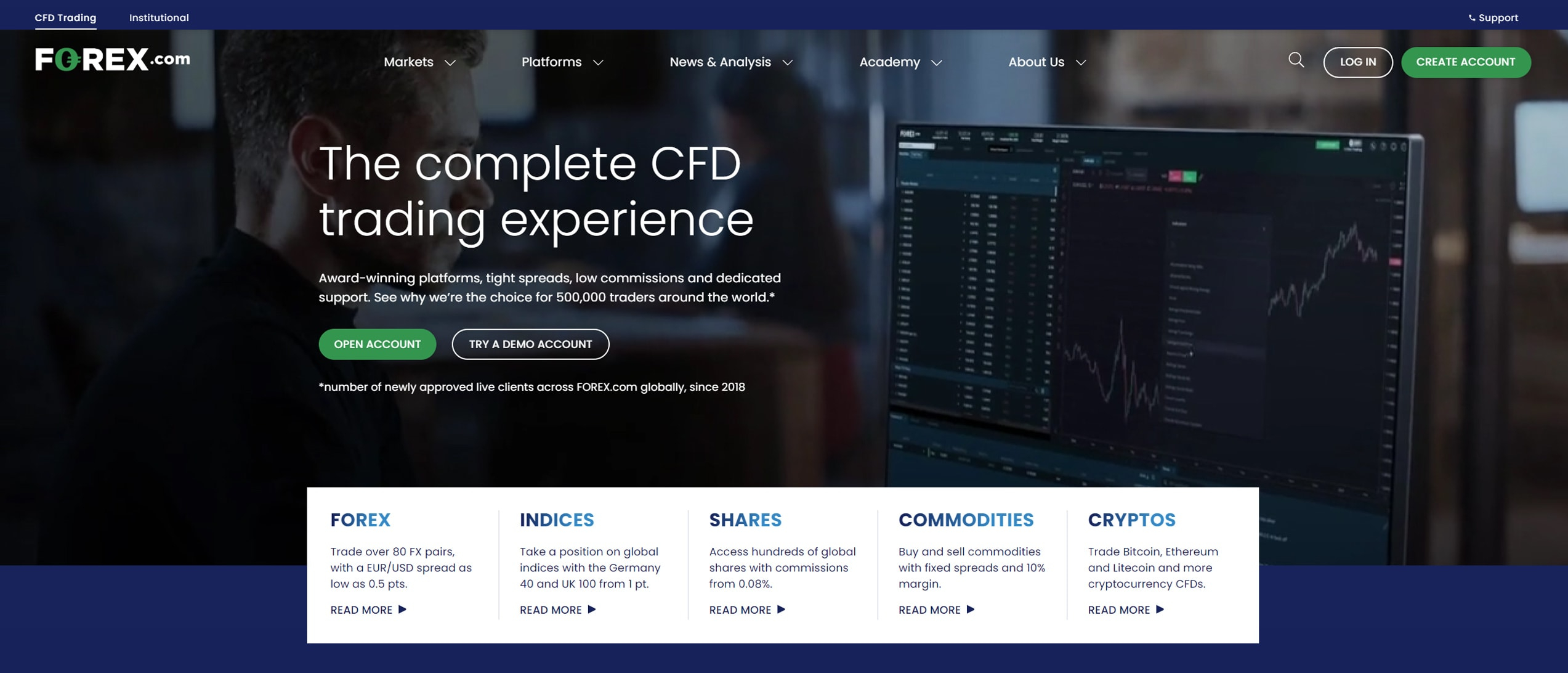
Further, this broker allows traders to invest in various other markets. These include forex, commodities, stocks, and cryptocurrencies. This means that traders interested in diversifying their portfolios do not need to leave the broker site. Moreover, the broker offers traders four different state-of-the-art trading platforms which include MetaTrader 4, MetaTrader 5, TradingView, and Forex.com Trader. These are fast trading platforms with advanced capabilities.
On regulations, this broker is part of the StoneX Group which has regulatory licenses in various jurisdictions. These include the FCA in the UK, the CySEC in Cyprus, the ASIC in Australia, and the CIRO in Canada.
76-77% of retail investor accounts lose money when trading CFDs with this provider.
eToro
eToro is another great choice for traders looking to invest in indices. This broker avails over 21 of the most popular indices with low spreads. These include CFDs on indices such as the US 30 index, UK 100, Nasdaq 100, US 500, and UK 100, among other popular indices. The spreads for trading indices start from as low as 0.02 points depending on the index a trader is investing in. For instance, at the time of writing, the NAS100 index has a spread of 0.015%, the UK100 offers a spread of 1.5 points, and the JPN225 has a spread of 10 points.
Just like Forex.com, eToro also features a plethora of market products for investors to trade. In total, this broker site has over 4,500 different instruments to invest in. These include CFDs on forex, stocks, cryptocurrencies, commodities, and ETFs alongside real stocks and cryptocurrencies. The sole trading platform available is the proprietary depth-of-the-market platform, eToro. The platform is intuitive enough for both beginner and experienced traders and comes with the CopyTrader technology.

Finally, let’s see how eToro’s activities are regulated. Well, this broker is subject to supervision and regulation by the FCA in the UK, the ASIC in Australia, and the CySEC in Cyprus. These are some of the top financial watchdogs in the market which helps with the reputation of eToro.
61% of retail investor accounts lose money when trading CFDs with this provider.
XM
XM is a tier-one CFD broker that offers traders low spreads on indices trading on some of the best trading platforms in the world. The broker provides the widely used MetaTrader 4 and MetaTrader 5 trading platforms, known for their advanced charting tools, technical analysis capabilities, and automated trading features.
Traders on XM can access popular indices such as the EU 50, FRA 40, US 30, VIX, and UK 100, among others. In total, this broker offers traders 20 different cash indices CFDs and 11 different futures indices CFDs. The spreads on this broker site are competitively low starting from a low 1.8 points on the US100Cash index CFD. The JP225Cash Index CFD has spreads from as low as 7 points. On the other hand, the GER40Cash Index CFD is available with spreads that start from as low as 1.8 points. In addition to indices, XM also offers CFDs on forex pairs, commodities, metals, energies, shares, precious metals, stocks, and cryptocurrencies.
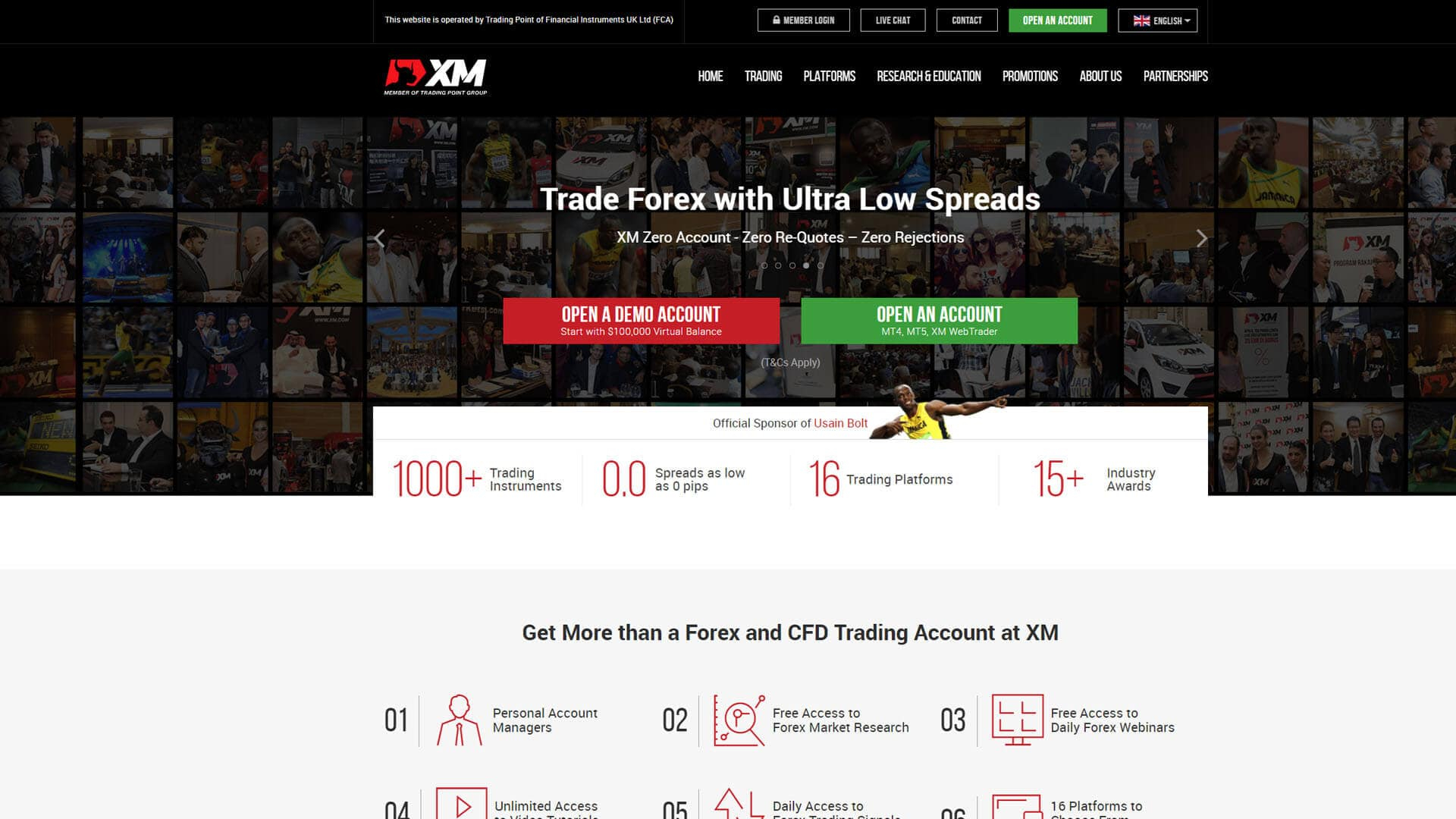
Finally, regarding regulation, XM holds licenses from major regulators, including the FCA, the CySEC, and the ASIC. These regulatory certifications ensure that XM adheres to strict standards, providing a secure and reliable trading environment for its clients.
75.18% of retail investor accounts lose money when trading CFDs with this provider.
IQ Option
IQ Option is a popular CFDs broker with over 48 million registered users as of 2020. This broker offers a user-friendly platform for indices trading along with various other financial instruments. The indices available on IQ Option include but are not limited to the US 30, Germany 30, UK 100, and France 40. IQ Option stands out for its fairly competitive spreads on indices trading. For example, the NAS 100 has a minimum spread as low as 1.35 points.
Apart from indices, IQ Option provides traders with the opportunity to trade CFDs on forex pairs, commodities, stocks, and cryptocurrencies. IQ Option offers a proprietary trading platform that can be accessed through desktop or mobile devices. The platform is known for its simplicity and intuitive design, making it suitable for both beginners and experienced traders.
In terms of regulation, IQ Option is regulated by the Cyprus Securities and Exchange Commission (CySEC). This ensures compliance with strict financial standards and provides a secure trading environment for users.
Libertex
Libertex is the last CFDs broker we will feature on this list. It is a well-established online trading platform that provides access to a variety of financial instruments, including indices. Traders using Libertex can engage in indices trading with a selection that includes major indices like the US 30, US 2000, VIX, FTSE 100, and more. The platform offers competitive spreads on indices, with specific values depending on the market conditions.
In addition to indices, Libertex allows users to trade a wide range of instruments such as CFDs on forex pairs, stocks, commodities, metals, and cryptocurrencies. The trading platforms available to use include MetaTrader 4, MetaTrader 5, and Libertex’s own platform, Libertex. Regarding regulatory oversight, Libertex is regulated by the CySEC. The CySEC regulation adds a layer of credibility to the broker.
Advantages of Indices Trading
- Diversification - Indices represent a basket of stocks from various sectors, providing built-in diversification. This reduces the risk associated with investing in individual stocks.
- Market Exposure - Trading indices provides exposure to the overall performance of a specific market or sector. This allows traders to gain broad market exposure without having to pick individual stocks.
- Liquidity - Major indices are highly liquid, meaning that there is usually a large volume of trading activity. This liquidity can result in lower bid-ask spreads and reduced price slippage.
- Transparency - Indices are transparent and often publicly available. This makes it easier for traders to analyze and understand the factors influencing their movements.
Disadvantages of Indices Trading
- Limited Individual Stock Analysis - Trading indices means you're not directly analyzing and trading individual stocks. If you enjoy the in-depth fundamental or technical analysis of specific companies, index trading may not fulfil that preference.
- Limited Control - Traders have no control over the composition of the index or the specific stocks included. Changes in the index are made by index providers, and traders must adapt to these changes.
- Volatility - While indices can provide diversification, they are not immune to market volatility. Rapid and unpredictable market movements can still impact index values.
Final Comments on Low Spread Indices Brokers
Choosing the best broker for indices trading involves careful consideration of various factors. These include fees, platform features, market access, and regulation. The brokers mentioned in this article offer different strengths and cater to various trading preferences. However, they have many things in common. They are all regulated by reputable organizations and offer competitive pricing. Still, the choice always comes down to an individual trader’s preferences.
Before selecting a broker, it's essential to assess your own trading needs and preferences. Consider factors such as the type of indices you want to trade, your preferred trading platform, and your level of experience. Additionally, stay informed about market developments and continuously seek to improve your trading skills through the educational resources provided by your chosen broker.
Top-Tier Trusted Brokers
The table below contains links to 3rd party websites of our top partners from whom we receive compensation at no additional cost to you.
























